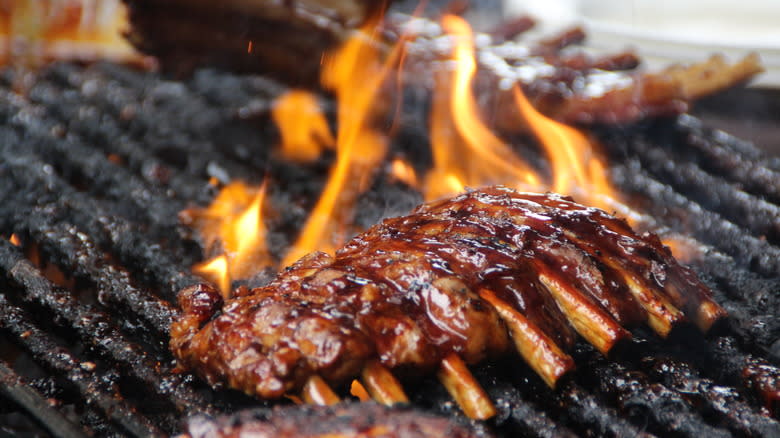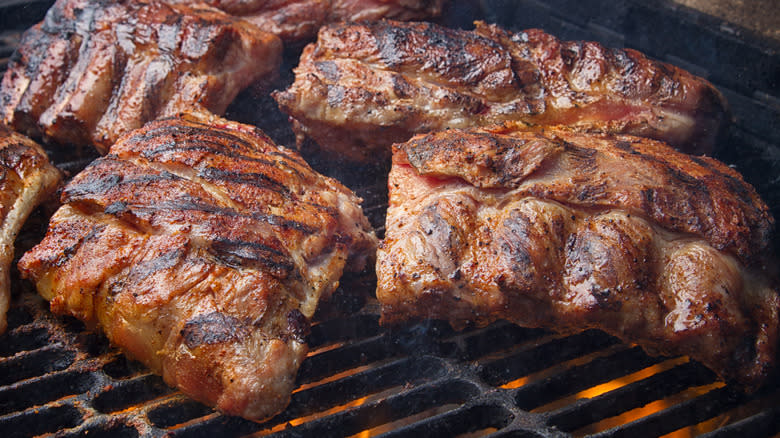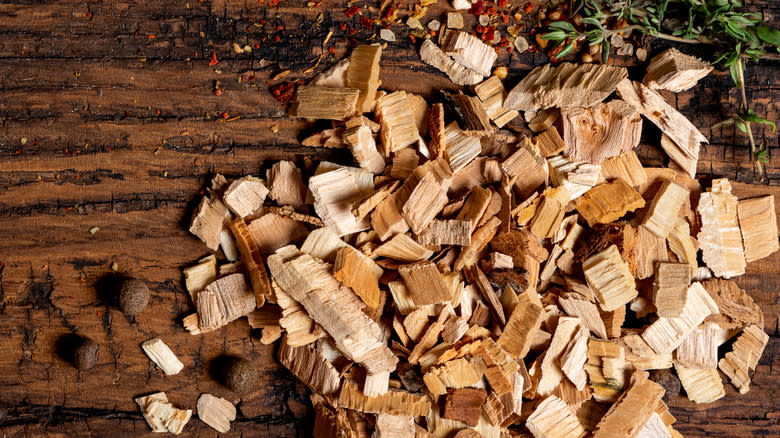The Absolute Best Wood Chips For Grilling Pork

Even though you're tossing meat onto a blazing inferno in a primeval manner, grilling pork is a deceptively delicate business. You have to stoke the embers until they're at the right temperature and cook the meat to a minimum of 145 degrees for safety. You have to consider humidity and sunlight and choose the size of the wood you want to grill with (chips, chunks, or logs). But before all that, you have to pick the right type of wood.
While most of those choices will be either correct or incorrect for the circumstances or desired outcome, the type of wood you burn is much more subjective. So Daily Meal turned to Brazilian Grill Master Silvio Correa to get some grilling insight. Wood will impart its flavor in the grilled pork, and often the wood choice relies primarily on taste — but there are still some woods that will be better suited to certain foods. Pork occupies a protein middle ground, in some sense; it isn't as mild and delicate as chicken or fish, nor is it as robust as beef. So, to get the flavors just right, fruitwoods are the way to go. As Correa explained, "Applewood and cherrywood chips are great for grilling pork."
Read more: The 13 Best Steaks For Grilling
Flavor From The Fruitwoods Of Your Labor

As an arboreal classification, fruitwoods cover everything from peach to pecan and maple to orange. However, applewood and cherrywood tend to match pork's flavor profile in a particularly delicious way and enhance the taste that's already there instead of overwhelming it. "Applewood gives a sweet, fruity flavor that goes well with pork's natural sweetness," Silvio Correa says, "while cherrywood adds a touch of tartness and sweetness."
Compared with hardwoods commonly used for grilling (e.g. mesquite, hickory, or oak), applewood and cherrywood are mild and light. Their sweet flavor is delicious but often won't stand up to proteins with a stronger flavor, like beef or brisket. When used for pork, though, they're complementary, and according to Correa, the flavors in applewood and cherrywood make "pork chops, ribs, or tenderloin even tastier." And if you've got even more grilling in your future, applewood and cherrywood are also great wood choices for chicken, fish, or even desserts and cheeses.
Just Some Tips For When The Wood Chips Are Down

Now that you've got the grill-master-approved fruitwood for unbeatable pork flavor, there are a few other factors to consider before you cook — like whether wood chips or wood chunks are the way to go if you're grilling meat. Wood chips are a great choice for shorter cooking times because they burn quickly and might need to be added more than once during grilling. Wood chunks will give you more time if you're planning a longer or slower cycle. Logs will probably need a larger grill, require a hotter temperature to burn correctly, and can be harder to control during cooking.
On the grill, pork will only take around 20 minutes to reach a safe temperature, so quick-burning wood chips are a convenient choice. And you can use them right away — because there's no need to soak them beforehand. Some grilling enthusiasts might let out a scandalized gasp at that pronouncement because there's still a lot of debate around it, but soaking wood chips for grilling isn't as useful as once thought. The water doesn't fully permeate the wood, even when soaked for a long time, so any moisture will be on the surface and dissipate before cooking starts. So ditch the water and light the chips — you'll be serving up sweet, fruity pork in no time.
Read the original article on The Daily Meal.


